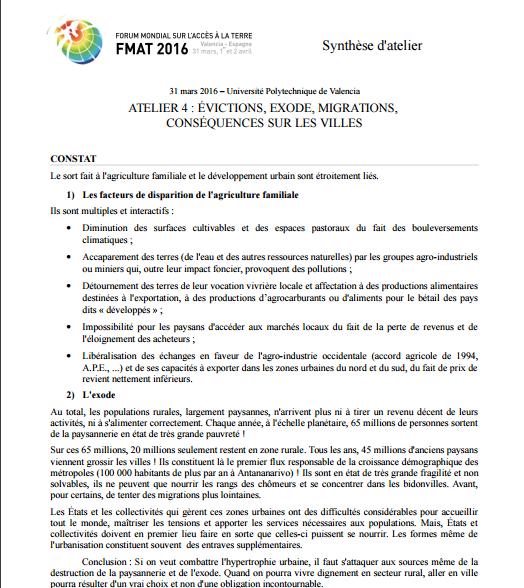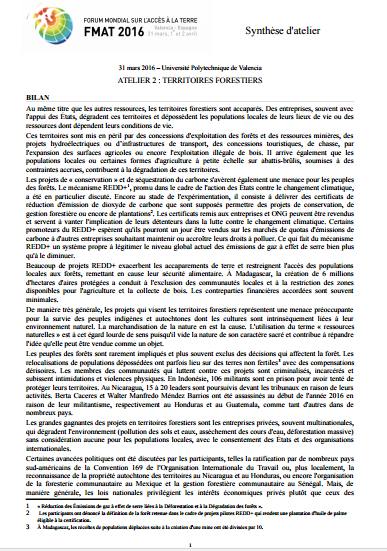Location
The goal of the WFAL 2016 had been to organise a world forum in 2016 to address the major issues linked to unequal access to land, natural resources (see The Call). Finally, the global assembly took place in Valencia, Spain (31st March, 1-2 April 2016) with more than 400 participants from 70 countries from today at the Global Forum on Access to Land and Natural Resources.
Ten years after the World Forum on Agrarian Reforms (Valencia, Spain, 2004) and the International Conference on Agrarian Reform and Rural Development (Porto Alegre, Brazil, 2006) the trends seemed unchanged if not worse.
Making a precise assessment of the situation had been imperative. An evaluation of the short and long terms consequences had been essential. It couldn’t must ignore none of the great economical, social, political and environmental prejudices due to the ongoing processes. It was the condition to identify responses able to solve the problems.
Implementing such an analysis had been possible according to the signatories of the WFAL 2016 Call, if citizens from every continent and the organizations in charge of representing or guaranteeing their interets could effectively debate into a structured and contradictory process: farmer and other civil society organisations, governmental organisations, indepedant or public research institutes.
The WFAL 2016 Call aimed at creating the conditions necessary for such a debate, with the guarantee that each one’s point of view and analysis had been taken into consideration by all, towards the invention of the most constructive proposals.
Members:
Resources
Displaying 21 - 25 of 25WORKSHOP 5: THE DIFFICULTIES OF WOMEN’S ACCESS TO LAND AND NATURAL RESOURCES
Throughout the world, the vast majority of women are faced with conditions of access to land and control of land and natural resources that are unequal to those of men.
Social relations have trivialized the fact that they are entirely in charge of domestic work and the education of children, which prevents them from devoting themselves as much as men to agricultural activities. In the fields, they are the forced laborers of the family and take on the often less valued tasks, considered as part of their domestic obligations. As a result, they generally receive no income.
ATELIER 4 : ÉVICTIONS, EXODE, MIGRATIONS, CONSÉQUENCES SUR LES VILLES
Le sort fait à l’agriculture familiale et le développement urbain sont étroitement liés.
WORKSHOP 4: EVICTIONS, RURAL EXODUS, MIGRATIONS, CONSEQUENCES FOR CITIES
There is a close relationship between the health of family farming and the state of urban development.
ATELIER 3 : L’ACCAPAREMENT DES RESSOURCES HALIEUTIQUES
On assiste actuellement au développement d’un ensemble de lois et de pratiques qui excluent les pêcheurs artisanaux et leurs communautés du contrôle des ressources halieutiques. Lorsque l’on évoque les phénomènes d’accaparements, un intérêt très faible et secondaire est généralement accordé à la question des ressources halieutiques. Pourtant, la pêche et l’aquaculture sont à la base de la survie économique de millions de personnes1. De même, l’activité halieutique est essentielle pour garantir la sécurité alimentaire mondiale.
ATELIER 2 : TERRITOIRES FORESTIERS
Au même titre que les autres ressources, les territoires forestiers sont accaparés. Des entreprises, souvent avec l'appui des États, dégradent ces territoires et dépossèdent les populations locales de leurs lieux de vie ou des ressources dont dépendent leurs conditions de vie. Ces territoires sont mis en péril par des concessions d'exploitation des forêts et des ressources minières, des projets hydroélectriques ou d’infrastructures de transport, des concessions touristiques, de chasse, par l'expansion des surfaces agricoles ou encore l'exploitation illégale de bois.




